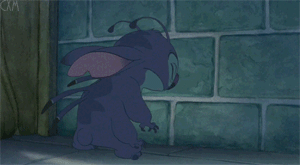
(Psssst: Did you get my terrible punny joke?)
I love series. (Eugh, plural rules, why do you rain on my autumnal parade?) I really do. HARRY POTTER, INFERNAL DEVICES, CURSE WORKERS, MORTAL INSTRUMENTS, etc. When it comes to YA, there is nothing that does it for me better than a good series. But I stand before you today, perched upon my shiny soapbox in my Sunday best (And yes, by that I mean slippers, pyjama bottoms and a Doctor Who t-shirt) to tell you that some later additions to these series are amazingly unnecessary.
Yes, you heard me. Unnecessary.
And to sum up the general feeling toward these unnecessary additions that are only in place because the publishing industry are cash-cows that really like to milk things until they're about as dry as an infertile woman's uterus (Bare with me: it's late and my metaphors and similes come to me from a strange place that's only visible to the naked eye at midnight.) you could have a quick look here, here and well, here and well, here.
Basically, these unnecessary additions are guilty of committing the following writerly sins: 1) Being really not funny, 2) Rehashes the same plots and conversations, 3) Attaining an off-the-charts not-entertaining ratings and 4) Losing all inspirational qualities.
There is a slow inching forward toward the climax that is akin to watching continental shift or waiting for Halley's Comet. You are told about every garment the characters are wearing and you are encumbered with the presence of recklessly created brain-children that arrive only to "mix things up", not to mention the post-series love troubles of the couple you've already endured romantic-hell with.
Yes, I speak to you about a trade increasingly common in the more NYT-Bestseller-List regions of the world with legions of authors partaking in the inhumane clubbing of plot bunnies. These poor defenceless bunnies - all they want is for Bella not to get impregnated and for Vapid-Girl and He-Creature to just jump into bed already before Morgan Freeman makes an appearance.
(Credit to Vinaya over at Goodreads.com for that, and for the tag) As human society evolves, so do its methods of torture. Our century gives us the YA Unnecessary Sequels, or YAUS (Like Klaus, but not). I'm biting my sore-ridden tongue here, but all the same: cash-grab, cash-cow, cash-slash-cop-out - you see where I'm getting at?
As writers, if we have a projected series in mind, it's in mind before we sell the first book. We have planned the overreaching plot arc and we've planned the interwoven plot lines and we've timed the romance or deaths or superstardom so that it all makes sense and the series and the standalone books come to a coherent halt at the end. But why is it that so many successful YA authors are now set up mid-career to inevitably reach their BREAKING DAWN?
And by BREAKING DAWN, you know exactly what I mean. Hint: YAUS.
I hate to say this (I feel like I'm smacking a toddler in the face by doing it) but Cassandra Clare, author of my beloved guilty-pleasure MORTAL INSTRUMENTS trilogy has taken this writerly sin to a whole new level. You know how I regard that trilogy, the non-masterpieces which made this critical madam sit back and breeze through without needing to bite back cynicism and without eye-twitching or projectile vomiting. Between the characters and the dialogue, those three books were akin in fun-factor to this:
I am Rapunzel in that analogy, in case you mistook me for Eugene.
So, yes, hi this is me, stoked and fist-pumping a couple months ago when I finished CITY OF GLASS and discovered that no, this was not the end to the series. It was only when I got CITY OF FALLEN ANGELS in my hot little hands a month ago that I hesitated. Technically, the story had finished. Jace and Clary weren't related anymore, Valentine and his real son were dead - But I wanted more of that Cassandra Clare dialogue and the sexy fun time with Alec and Magnus. Hm. What's a fan to do?
Reading such a book after already telling yourself that disappointment is imminent is like in that movie with Renee Zellweger - Case 39 - when you see the girl's parents put her in the oven at the beginning and you're shocked!
But then by the end of the film you're like (and I kid you not, I swear the slogan should be): Get that bitch back in the oven! The very moment that I finished CITY OF FALLEN ANGELS I wasted a good minute wondering whether it was possible to unread a book.
(No, I don't mean that. Sort of, but not really.)
I really thought we could be friends, book, given that your brothers and sisters stirred deep emotions in me that had me questioning myself but you, you made me feel like how I do after I watch a B-grade movie on a Saturday morning because Batman: the Brave and the Bold is on and I really don't like Batman: the Brave and the Bold so I flick over to the movie channel. You, dearest book, left a sour taste in my mouth that won't go away.
I think we need to go back to our primary school days where you vaguely remember one of your teachers mentioning in passing some comment about quantity not being quality? No? Just me? Alright then.
Let me put it this way: The MORTAL INSTRUMENTS series-no-longer-trilogy will (including its prequel series) comprise of nine books altogether, exceeding that of HARRY POTTER and the CHRONICLES OF NARNIA? Sure, I can go in denying the cash-cow-slash-vain-grab-at-emulating-the-epic-series-mentioned-above, but if it oinks like a pig and looks like a pig, I'm sorry Cassie, but it ain't a horse, I'll tell you that.
The truth is that unless these series have been planned and orchestrated by the author from the very beginning to be long series, you can almost guarantee that once they exceed the original limits, they will lose their flavour. Characterisation will dwindle and fade, new villains become carbon-copies or laughable, growth becomes forced and unbelievable and plot disintegrates to the point where they characters have been shoved onto a stage and the author is throwing peanuts at them to make them dance. (Look-ey here, I thought of another example: What series just had its latest instalment come out by the name of ANGEL?)
It takes a lot to build such a following that just slapping your name on a cover will generate a jaw-dropping revenue (*cough*CusslerPatterson*cough*). But for the YA authors I'm pointing the finger at today, it's not their name, but their characters or world that attracts their fans. By the way some of these fangirls talk about these leading men, you'd think their saliva was made of awesomejuice, or that the flesh on their face was made of the Ark of the Covenant (Your face might melt off if you look at him!).
But these authors and their insufferable hubris are hurting the genre's reputation and I don't know how much more I can take. It will only make it harder for debut authors in the future, and might even lose the entire genre some really important readers (You know the ones. They're the one-star reviews you read on Goodreads.com who call authors on their bullshit constantly). So, someone needs to take a stand, someone needs to say enough. (Yeah, I'm going all Clash of the Titans on y'all) Enough with the YAUS and cash-grabs and enough with the metaphorical singing to the magical golden hair (a la Tangled). Do like Eugene "Flynn Rider" Fitzherbert and cut that mop of hair off!
What happened to the standalone novel? No, not the one you read once and then leave on the bottom shelf because you'd never ever read it again. I'm talking about the work of fiction so great that the author couldn't possibly add any more to it. It's not a matter of cash here, I assure you. Look at Markus Zusak! Nothing but standalone novels and his is a name that bears a pretty flashy weight. (It's probably diamond-encrusted)
I realise that I'm treading dangerously close to preachy elitist here, but how do we expect to produce books of any lasting quality when all we're getting are these self-detrimental series that never end? It's not just YA, this syndrome is starting to reach for the Adult market too. It's like the sequels to The Lion King or to Aladdin - most know these terrible things exist, but we try to forget them and hope that this will make them disappear...Almost as if they never happened. There's a common acronym used in chat speak that summarises this pretty well: TITF. Took it too far. Damn far.
So, end rant. Shake fist.
Now, how does this affect you?
I know a lot of authors who sit on the big metaphoric fence (which is the same fence I envision when I imagine Tom Sawyer and those kids painting that big ol' fence) between choosing to work on a standalone or a series, or choosing to keep the trilogy instead of continuing the plot into a longer series. I myself have struggled with this; the number of novels in my own series fluctuates with how I feel about my overarching plot.
You need to make your decision without worrying about the market, without trying to emulate that really cool series you just read. Put everything out of your mind and sit down with your characters and your bigger picture and chat.
If you have a cast of five, you need to occupy all five of those character for the duration of whatever novels you write. ALL FIVE. This is one of the many pitfalls writers topple into. Where was Magnus and Alec for half of CITY OF FALLEN ANGELS? Globe-trotting. Why? Because Cassandra Clare probably didn't know what to do with them before it was time for them to come out on stage.
I can't match the majesty of the Book Lantern's Sequel Syndrome and the Death of the Standalone Novel post, (I really can't, so go look at it!) hence, I'm just giving it to you. I can't even summarise it, it's so wonderful. So go read it - after you finish up here, of course.
There are a few people who think that the only hope you have of publishing is to have a first book that is a "standalone with series potential". Bullshit. Agents know a series when they see one. Well, in my opinion they do. You either have a series or you don't. I can see how a novel about a girl working for a paranormal enforcement agency has "series potential" but a story about a girl and her magical boyfriend? Not so much.
Then again, some look at a standalone as being a book that has a major conflict set up at the beginning that is resolved by the end. In the case, HARRY POTTER, more or less, is comprised of seven standalone novels (Though anyone who picked up THE DEATHLY HALLOWS first would have some ride of total confusion ahead.), especially earlier on. THE PHILOSOPHER'S STONE, for example, does exactly this. And to some extent, Holly Black's WHITE CAT does as well. Cassandra Clare's MORTAL INSTRUMENTS does not do this.
If you make your readers ache and wonder how things are going to turn out, if you leave them with unresolved plots or untouched relationships or unclear deaths - you're inching toward a sequel, right? Usually, this is used in a situation where the author has used circumstances that wouldn't realistically be resolved in one reasonably sized novel. (I'm raising my hand because, yes, I am unashamedly doing this right now with my own novel-slash-first-of-a-series)
I personally don't think there is a correct one to choose, though the market seems to think that the latter is the more promising. Just remember that you're pitching this to the world. If you think your talent and your story stands better on its own, don't force sequels. Yes, they're all the rage and publishers sometimes want an author they can grow a readership for, but if you haven't got the rare goods, you're not going to get a readership. And if you force it, everyone will be able to tell. Everyone. Even that hillbilly from the Simpsons.
And remember: nothing scares agents and publishers more than a long multi-volume series where each book depends on its predecessors. That's a lot to deliver on.
What do I recommend? Next time you're procrastinating from writing your first draft or from editing or revising, instead of watching Youtube videos of Charlie biting his brother or that dog and the steak, buy a roll of wrapping paper, sit on your floor, turn it over and start writing out an overarching plot. If it doesn't work, then you know that it's not going to work. If it does, then voila! You have your series planned out properly. You need to decide what side of the fence you're sitting on, because if you sit on the fence itself and the time comes to force sequels out because you can't refuse because you're not sure still - you and your story are going to suffer.
And curtain.
Thoughts? As always, the comments are below.

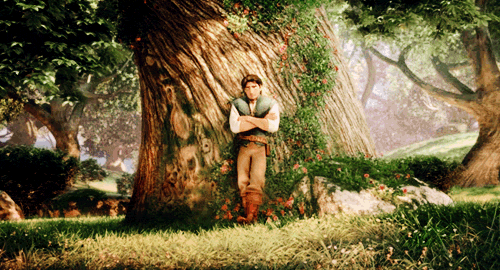
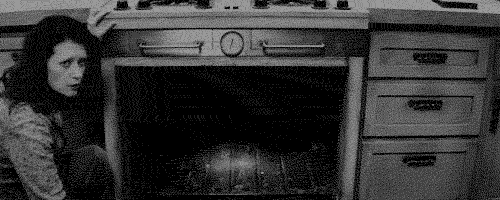
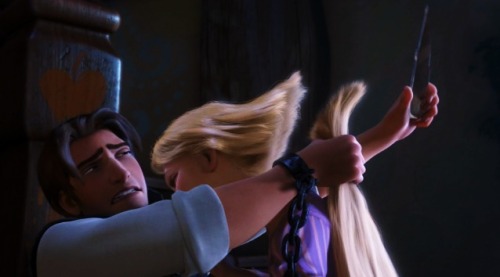
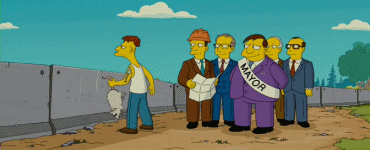
I agree with you 100%. In fact, even stand-alones become a pain in the ass if they feel like they've been churned out on publisher demand. Seriously, people, how do you assume that readers can't tell?
ReplyDeleteI'm doing a four part series, planned out as such. Unless book four becomes too long, in which case there will be a fifth, if four can be divided neatly. If it can't, I'll rewrite four until either the split or the end is possible.
:-)
"...but if it oinks like a pig and looks like a pig, I'm sorry Cassie, but it ain't a horse, I'll tell you that." = IRL LOL
ReplyDeleteTrue dat, I say. True dat.
I originally outlined a four-book series, until I started studying the craft and realized it would be BETTER if I culled a lot of stuff back and let it be a trilogy.
Remind me of that when I'm a flashy, cash-cow feeding author so I won't believe my own hype and start stretching... ;)
Some times a series of "stand-alones" feel a little too episodic, and I will agree, they seem to rehash the same ole' story line.
ReplyDeleteI just finished reading that last book in a series of three, and I just couldn't get into it because it felt like formula. Though the setting and enemies were different, everything functioned in exactly the same way as the first. I loved the first in the series, but sometimes a poor ending can sour the whole series *cough* Harry Potter *cough* (Yeah, I hated Deathly Hallows)
Nice post.
ReplyDeleteAlthough I enjoy series (such as Rick Yancey's Monstrumologist) all the writing I'm doing is pretty much centered on standalones. I'm fascinated by the coherent and complete story, the slice of a world that has an ending clearly in view and in mind.
Granted, I also just devoured The Hunger Games, so take my viewpoint for the irrational, spur-of-the-moment snapshot that it is.
I agree with your whole post, especially the City of Fallen Angels part and Maximum Ride. Those series should not be allowed to continue. -_-
ReplyDeleteI agree. I had a feeling Fallen Angels wasn't going to live up to the first 3. I adore this series and have been reluctant to buy the 4th. I eventually will.
ReplyDelete